 |
 |
02.12.26

Leading Thoughts for February 12, 2026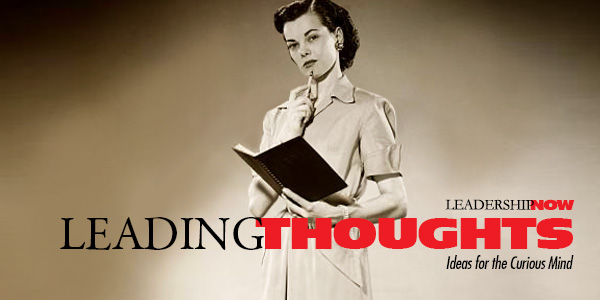
IDEAS shared have the power to expand perspectives, change thinking, and move lives. Here are two ideas for the curious mind to engage with: Mark Crowley on being passionately curious: “Something insidious often happens when people become adults. We become almost anti-curious. One big reason for this is that our human egos prefer to feel knowledgeable and successful at all times. Not wanting to feel vulnerable to anything unknown or in flux, our minds silence otherwise solid reasons to seek new methods, approaches, or skills. ‘You’re already doing great,’ our egos assure us. ‘There’s no need to invest time and energy in anything new.’” Source: The Power of Employee Well-Being: Move Beyond Engagement to Build Flourishing Teams Todd Henry on knowing yourself: “The stories we believe about how the world works often play a critical role in helping us interpret the meaning of events. It’s important that we gain an understanding of not only what those deeply held beliefs are, but also how they might be affecting our daily activity. Doing so, and then mapping our activity around that self-knowledge, is one of the keys to sustained success.” Source: Die Empty: Unleash Your Best Work Every Day Look for these ideas every Thursday on the Leading Blog. Find more ideas on the LeadingThoughts index.
Posted by Michael McKinney at 11:40 AM
02.09.26

Learn Faster by Failing Smaller: How Making Mistakes Can Become a Brilliant Source of Growth
WE’RE often told about the benefit of learning from our failures, but the reality is that it’s easier to say than do. Failure feels uncomfortable and exposing. Rather than sit in vulnerability, it’s much easier to move forward and replace reflection and regret with action and distraction. But leaving the learning behind means we miss an opportunity to grow. Our career resilience relies on being able to navigate hard moments with confidence and control and become better because of them. Whether it’s a presentation that’s gone wrong, a relationship that has broken down, or an important deadline that you’ve missed, our first response should be to pause, reflect, and learn from the situation. Waiting for a BIG failure makes it hard to develop this skill. Big failures don’t happen often and come with lots of emotion. Trying to change your behavior when you’re in the middle of a big failure can feel doubly difficult. It’s much better to look for smaller failures to learn from, also known as mistakes. Mistakes are a much easier place to start. We all make lots of mistakes, so we have many more moments to learn from, and they are less emotionally charged so reflection feels less daunting to do. A mistake might look like sending the wrong information in an email, arriving late for a meeting or not having the right data you need for a discussion. Mistakes won’t be disastrous for your development, but missing out on the learning might be. Repeating the same mistake can affect your reputation and lead to small issues, causing more significant problems over time. Turning mistakes into learning is a healthy habit for everyone’s development. There are two ways you can start to learn from mistakes: 1. Mistake meetings – these work well as a team learning activity. A regular meeting goes in the diary (monthly seems to be the right cadence for most of the teams that we work with), and everyone brings a mistake they have made. The mistake is shared, the team offers support, and a plan to prevent the mistake from being made again is co-created. The benefit of this approach is that the discussion creates trust in the team and means that everyone is more likely to buy into doing things differently in the future. 2.Mistake moments – this approach works individually or as a team and has created more immediacy than waiting for a meeting to go in the diary. With Mistake Moments, the reflection happens within 24 hours of the mistake happening. The mistake is either written down or shared with a group on the day via an online communications channel like Teams or Slack. A similar structure is used for each mistake: What was the mistake, why did it happen, and how can you learn from it. The benefit of this approach is that the weight of a mistake doesn’t sit with anyone for long, support is offered rapidly, and learning from mistakes can quickly become a routine. The more regularly you reflect on your mistakes, the less exposing failure feels. Instead of moving on and leaving the learning behind, we become more comfortable with the inevitable change and challenge we all experience at work, and much more skilled at growing through what we go through.  
Posted by Michael McKinney at 05:07 PM
02.08.26

Who’s the Smartest Person You’ve Ever Met?
On her podcast A Bit Personal, Jodi Shelton asks NVIDIA founder and CEO who’s the smartest person you’ve ever met? Jensen Huang: “I can’t answer that question. And I know I know what people are thinking. The definition of smart is somebody who’s intelligent, solves problems, technical, but I find that’s a commodity. And we’re not, we’re about to prove that artificial intelligence is able to handle that part easiest, right? Yeah. And so, as it turns out, let me give you another example. “Everybody thought software programming was the ultimate smart profession. Look, what is the first thing that AI is solving? Software programming. And so, it turns out that the definition of smart is very different than most people think. And I think long-term, the definition of smart and my personal definition of smart is someone who sits at that intersection of being technically astute but human empathy and having the ability to infer the unspoken, the around the corners, the unknowables. You know, people who are able to see around corners are truly, truly smart, and that their value is incredible. To be able to preempt problems before they show up, just because you feel the vibe. And the vibe came from a combination of uh data, analysis, first principle, life experience, wisdom, sensing other people. That vibe that I think that’s smart, that I think is going to be the future definition of smart, and that person might actually score horribly on the SAT.” The complete interview is a treat to listen to and you can find it on Shelton’s YouTube page. A Bit Personal is a long-form interview podcast hosted by Jodi Shelton that explores leadership through a human lens. Featuring candid conversations with technology leaders, the show focuses on the personal experiences that influence how decisions are made at scale.
Posted by Michael McKinney at 11:39 AM
02.05.26

Leading Thoughts for February 5, 2026
IDEAS shared have the power to expand perspectives, change thinking, and move lives. Here are two ideas for the curious mind to engage with: Brad Stulberg on being patient: “Remember that doing stuff for the sake of doing stuff isn’t progress. It’s just doing stuff. Be patient, you’ll get there faster.” Source: The Practice of Groundedness: A Transformative Path to Success That Feeds—Not Crushes—Your Soul Cognitive scientist Maya Shankar on ruminating: “When a big change occurs, our negative thoughts can take on a life of their own, nestling into our psyches and stoking our biggest fears. This is known as rumination, and it can involve obsessively rehashing something in the past, grappling with perceived problems in the present, or catastrophizing an imagined future. When we ruminate, we keep going over and over the same negative thoughts, and we get stuck in a loop. Our brain trick us into believing we’re making progress on our problem when we’re often just making things worse.” Source: The Other Side of Change: Who We Become When Life Makes Other Plans Look for these ideas every Thursday on the Leading Blog. Find more ideas on the LeadingThoughts index.
Posted by Michael McKinney at 10:47 AM
02.01.26

First Look: Leadership Books for February 2026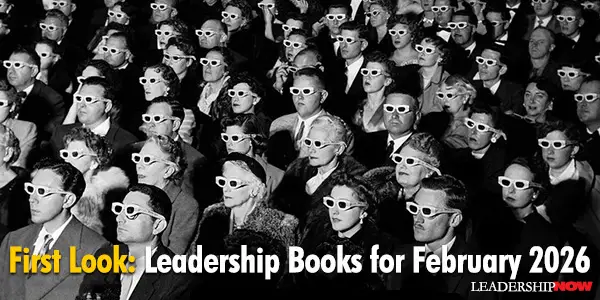
HERE'S A LOOK at some of the best leadership books to be released in February 2026 curated just for you. Be sure to check out the other great titles being offered this month.
Meetings are broken. They are relics from a bygone era of top-down hierarchies and factory-like procedures—designed to issue orders, flaunt power, and keep the hierarchy intact. In today’s digital, collaborate-or-bust era, this model isn’t just inefficient, it actively harms employees and organizations. Drawing on decades of research and stories from leading companies like Google, Salesforce, Pixar, YouTube, and Dropbox, Your Best Meeting Ever provides a blueprint to transform your meetings from monotonous, soul-crushing time sinks into powerful tools for collaboration. The secret? Treat them like products. Using seven product design principles, you’ll turn your meetings into well-designed products that actually drive work forward and serve your most important users—the people in your organization.
Welcome to the Transformation Economy. To truly compete in today's marketplace, enterprises must create transformative experiences that guide customers to achieve their aspirations, whether that's improving well-being, increasing prosperity, developing knowledge, or finding purpose. These aspirations speak to customers' greatest desires, their dreams for the future, and their conceptions of who they are and who they strive to be. In this book, bestselling author B. Joseph Pine II builds on his iconic work on the Experience Economy to explain what this new shift means for companies looking to stand out and gain competitive advantage. Using examples from organizations across industries, including Noom, Symplany, Hydrafacial, London Business School, and Johnnie Walker Whisky, Pine provides practical, proven frameworks for organizations to design, create, and guide transformative offerings that help customers reach their greatest aspirations and flourish over the long term.
Answer six simple questions daily and you can change almost anything. If you’ve ever hit a goal and thought, Now what?—you’re not alone. Permanence is your tool for lasting success—not the kind that’s here one day and gone the next, but the kind that sticks with you. How? Small, consistent steps—six questions daily—that keep you focused, on track, and synced with what you care about most. The real challenge isn’t just getting there. It’s staying there. In this book, you’ll learn the Daily Question Process, how to use feedforward instead of feedback, and how to build systems of accountability that actually work. You’ll stop thinking about quick wins and start getting better and better in a sustained way—driven by who you want to be, not what others are doing.
In an AI world that can write, code, and design, what's left for humans? Everything that matters. The world is changing fast. Are you ready for what's next? Technical skills alone won't keep you ahead anymore. Creativity has now become the dividing line between those who will lead the future and those who will be automated out of it. This book shows you how to build the creative abilities AI can't touch: finding problems worth solving, linking ideas in new ways, and infusing work with meaning that only humans understand. These aren't vague ideas - they're real skills you can start building today.
A Harvard Business School professor's guide to thinking about thinking, using the creative power of the unconscious. Gerald Zaltman's pioneering research methods for understanding the unconscious desires of customers are used by companies around the world. Dare to Think Differently draws on the same groundbreaking methods to explain the deep and innovative thinking used by highly successful executives. Reflecting emerging viewpoints in neuroscience, Zaltman contends that multiple forces, not just a brain, collaborate to produce a mind. Highly effective decision-makers are able and willing to go beyond their conscious thinking and surface powerful, creative, unconscious thoughts and feelings. They candidly ask whether what they feel they "know" is actually warranted, opening their minds to new alternatives. With this book, Zaltman presents six techniques to tap into the creative power of the unconscious: serious playfulness, befriending ignorance, asking the right discovery questions, chasing your curiosity, panoramic thinking, and using the "voyager outlook."
An empowering guide to career growth that reveals how to “be more lobster” —to never stop learning and pave the way to a meaningful working life. In today’s working world, careers are characterized by change. You can take control of your own development at any time, but many of us don't as we feel held back by time, money, or imposter syndrome. Careers used to be linear and ladder-like. They were about following in other people’s footsteps and focused on getting to the top. This predictable approach to careers no longer fits—and it doesn’t reflect people’s reality or their individuality. Enter the lobster, which never stops growing.
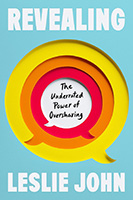 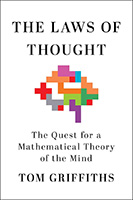 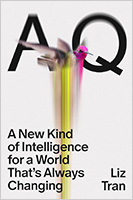 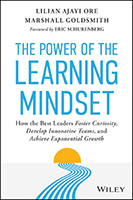
“I read books because, at their best, they make me better, more empathetic, more socially aware, more in tune to the stranger beside me. They help me imagine a better future, provide me with answers to my insatiable questions, take me to places I’ll never get to go. ” — Annie B. Jones
Posted by Michael McKinney at 05:53 PM
01.31.26

LeadershipNow 140: January 2026 Compilation
See more on
Posted by Michael McKinney at 08:59 AM
01.29.26

Leading Thoughts for January 29, 2026
IDEAS shared have the power to expand perspectives, change thinking, and move lives. Here are two ideas for the curious mind to engage with: Heidi Grant on feedback: “What happens when people lack a feeling of effectiveness? In the short term, it wipes out motivation. Research shows that when people are unable get any kind of feedback about how well they are doing on a task, they quickly become disengaged from it.” Source: Reinforcements: How to Get People to Help You Simon Sinek on trust: “Leading is not the same as being the leader. Being the leader means you hold the highest rank, either by earning it, good fortune or navigating internal politics. Leading, however, means that others willingly follow you—not because they have to, not because they are paid to, but because they want to.” Source: Start With Why: How Great Leaders Inspire Everyone to Take Action Look for these ideas every Thursday on the Leading Blog. Find more ideas on the LeadingThoughts index.
Posted by Michael McKinney at 03:17 PM
01.22.26

Leading Thoughts for January 22, 2026
IDEAS shared have the power to expand perspectives, change thinking, and move lives. Here are two ideas for the curious mind to engage with: Jason Feifer on the good ol’ days: “If we’re surrounded by the belief that yesterday was better, we’ll become less open-minded to future opportunities. To prepare for an uncertain future, we need to release ourselves from the rosy memory of our past—and begin to build a new, more durable narrative about ourselves instead.” Basketball coach Geno Auriemma on leading: “I used to think that I could affect winning and losing. I,I,I,I I keep using that word. Then it became more of, I have very little control of winning and losing, the only thing I have control of is … am I putting them in a position every day in practice to learn how to win?” Source: VIDEO The Psychology of Feedback via What Drives Winning Look for these ideas every Thursday on the Leading Blog. Find more ideas on the LeadingThoughts index.
Posted by Michael McKinney at 03:42 PM
|
BUILD YOUR KNOWLEDGE
 

How to Do Your Start-Up Right STRAIGHT TALK FOR START-UPS 
Grow Your Leadership Skills NEW AND UPCOMING LEADERSHIP BOOKS 
Leadership Minute BITE-SIZE CONCEPTS YOU CAN CHEW ON 
Classic Leadership Books BOOKS TO READ BEFORE YOU LEAD |